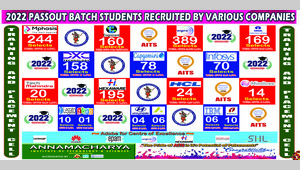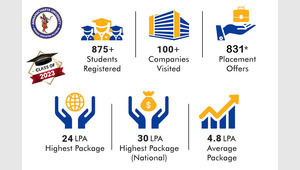Department
Master of Computer Applications - Academics
Feedback
In our department Feed Back helpful information or criticism that is given to someone to say what can be done to improve a performances.
| S.NO | FEED BACK TYPES |
| 1. | Faculty Feed Back |
| 2. | Student Feed Back |
| 3. | Parent Feed Back |
| 4. | Alumni Feed Back |
| 5. | Employer Feed Back |
| 6. | Exit Feed Back |
Faculty FEEDBACK
Faculty feedback refers to the evaluations, comments, and insights provided by faculty about various aspects of the educational environment, including the performance of students, the effectiveness of Faculty methods, and the quality of curriculum and institutional support. This feedback can focus on several areas:
- Student Performance: Faculty provide feedback on students’ academic abilities, participation, behavior and overall progress in their classes.
- Curriculum Effectiveness: Faculty may evaluate the relevance, structure, and comprehensiveness of the curriculum, suggesting improvements or highlighting areas that work well.
- Faculty Resources: Opinions on the availability and quality of resources provided for teaching, such as textbooks, technology, classroom materials and facilities.
- Professional Development: Feedback on opportunities for Faculty’ own growth and development, including training, workshops and continuing education.
- Classroom Environment: Facultys might provide insights into the physical and social environment of the classroom, including issues related to discipline, student engagement and inclusivity.
- Student Needs: Facultys often provide feedback on how well the institution is meeting the diverse needs of students, including those with special educational needs or different learning styles.
- Institutional Policies: Feedback on school or college policies, including those related to grading, discipline, attendance and other aspects of the educational process.
STUDENT FEEDBACK
Student feedback refers to the input and evaluations provided by students regarding their experiences at an educational institution. This feedback covers various aspects of their academic and non-academic life and serves as a valuable tool for improving the quality of education and services offered by the institution.
- Teaching Quality: Students provide their opinions on the effectiveness of instructors, teaching methods, clarity of explanations, engage in the classroom and the overall quality of instruction.
- Course Content: Feedback on the relevance, depth, and organization of the course material, including whether the curriculum meets their learning needs and expectations.
- Learning Environment: Students might comment on the atmosphere of the classroom, including aspects like inclusivity, respect and encouragement for participation.
- Assessment and Evaluation: Opinions on the fairness, frequency, and clarity of exams, assignments and grading criteria.
- Academic Support: Feedback on the availability and effectiveness of academic resources, such as tutoring, advising and access to faculty for extra help.
- Facilities and Resources: Evaluations of the quality and availability of campus facilities, including libraries, labs, study spaces and technological resources.
- Extracurricular Activities: Opinions on the range and quality of extracurricular opportunities, including clubs, sports, arts and other student organizations.
- Personal Development: Reflections on how the institution supports personal growth, including opportunities for leadership, critical thinking and social interaction.
Student feedback is essential for educational institutions as it provides direct insights into the student experience, allowing the institution to make data-driven decisions to improve teaching practices, course offerings, campus services, and overall student satisfaction.
PARENT FEEDBACK
Parents feedback refers to the input and opinions provided by the parents or guardians of students regarding their child’s experience at an educational institution. This feedback covers various aspects of the student’s educational journey and the institution’s overall environment.
- Academic Experience: Parents may provide feedback on the quality of education their child is receiving, including the effectiveness of teaching, the rigor of the curriculum and academic progress.
- Student Support: Opinions on how well the institution supports students through counseling, mentoring and academic advising.
- Communication: Feedback on how effectively the institution communicates with parents about their child’s progress, upcoming events and any issues or concerns.
- Campus Environment: Evaluations of the safety, inclusivity, and overall atmosphere of the campus, including whether the environment is conducive to learning and personal growth.
- Extracurricular Opportunities: Parents might give feedback on the availability and quality of extracurricular activities, such as sports, arts, clubs and other non-academic programs.
- Value for Money: Opinions on whether the education and services provided are worth the tuition and other costs associated with attending the institution.
- Personal Development: Insights into how the institution has contributed to their child’s personal, social and emotional development.
- Facilities and Resources: Feedback on the adequacy of campus facilities, such as libraries, laboratories, sports complexes and housing.
Parents’ feedback is valuable for educational institutions as it provides a perspective on how the institution is perceived by those who play a significant role in students’ lives. It can help colleges identify areas for improvement and ensure that they are meeting the expectations and needs of both students and their families.
ALUMNI FEEDBACK
Alumni feedback refers to the input and insights provided by former students of an educational institution regarding their experiences both during and after their time at the institution. This feedback typically covers a range of topics.
- Post-Graduation Success: Alumni may provide information about their career progress, further education or other achievements after leaving the institution.
- Quality of Education: Alumni often reflect on how well the education they received prepared them for their careers or further studies.
- Institutional Support: Feedback on the support services they received, such as career counseling, networking opportunities or mentoring programs.
- Curriculum Relevance: Opinions on whether the curriculum was up-to-date and relevant to current industry standards and trends.
- Long-term Impact: Alumni might share how their college experience influenced their personal and professional development over time.
- Suggestions for Improvement: Alumni often provide constructive feedback on areas where the institution could improve to better serve current and future students.
Alumni feedback is valuable for institutions as it helps them assess the long-term effectiveness of their programs and services, and it can guide future improvements in educational offerings and student support.
EMPLOYER FEEDBACK
Employer feedback refers to the input and evaluations provided by employers regarding the performance, skills, and preparedness of graduates they have hired from a particular institution. This feedback typically focuses on several key areas:
- Job Readiness: Employers assess how well-prepared graduates are for the demands of the job, including their technical skills, knowledge and ability to apply what they learned in college.
- Soft Skills: Feedback on graduates’ communication abilities, teamwork, problem-solving, adaptability and other interpersonal skills that are crucial in the workplace.
- Work Ethic: Evaluations of graduates’ professionalism, reliability, punctuality and commitment to their roles.
- Performance: Overall assessment of how well graduates are performing in their roles, including their ability to meet job expectations and contribute to the organization.
- Training Needs: Employers might highlight any areas where additional training or development is needed for graduates to be more effective in their roles.
- Comparison with Other Graduates: Employers may compare the performance of graduates from different institutions to provide a benchmark for the quality of education and training provided.
EXIT FEEDBACK
- Quality of Education: Evaluations of the curriculum, teaching methods, faculty and learning resources.
- Campus Facilities: Opinions on the availability and quality of campus facilities such as libraries, labs, sports facilities and accommodation.
- Administrative Support: Feedback on the effectiveness and helpfulness of the administrative and support staff.
- Extracurricular Activities: Insights into the opportunities for involvement in clubs, sports and other non-academic activities.
- Career Services: Opinions on the effectiveness of career counseling, internships and placement services.
- Personal Growth: Reflections on how the college experience contributed to their personal and professional development.





